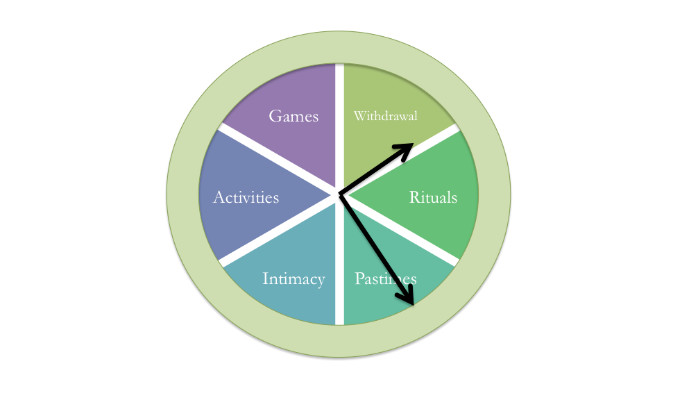(as promised last time: an even more exciting approach to Time)
Surprisingly, the one study which looked at Time in a more fundamental way from psyche/behavior/energy point of view is again never evoked/invoked for Senior Management and Leadership for time and career structuring.
Transactional Analysis (TA) is one of the most underrated and underutilised fields of study in the world. It is not the flavour of the season at a lot of places and most people would immediately lose interest at the mention of its name. These are the people who were never taken to the dizzying heights of what TA can deliver. (They were only taken only through the confusing mazes of Ego-States. Or tried to read “Games People Play”. Or both!)
What is the fundamental unit of human psyche/behavior/interaction? Take a minute to think on that before you read further. The beauty of this study is that it tried to grapple with this question and come up with a unit like the ones used in sciences. The entire TA is a map of human destiny, joining piece by piece, to become bigger units from this fundamental unit. One can measure the quality of one’s moments, days, years and overall life with the help of these units.
Eric Berne, the founder of TA, called the basic unit Stroke. Yes, the same stroke as in physically stroking the back of a crying child. And also as in the psychologically stroking through long appreciation mail, a smile in the corridor, or a smiley in social media message.
TA says human beings have two fundamental hungers, Stroke Hunger and Structure Hunger. Structure Hunger, the hunger to collect strokes, can be more or less or moderate, like the hunger for food.
Structure hunger is “What do I do with the 24 hours of my day?” A lot of us would smile at this because our days go past without us really having to worry about planning it. The days are now on an automaton.
Actually, we answered this question long back in our life. Even before we entered a double digit age, we solidified that answer, and we are living our life inside that answer, that programming, more or less like a robot now.
At the core however, Structure Hunger is not distinct from Stroke Hunger, but subservient to it. When we rephrase the original question this connection becomes clearer. What every human being tries to answer when the world forces him or her to grow up is, “How do I structure my time so that I do those interactions, which take care of my stroke hunger”.
Each one comes up with a different mix of Time Structuring depending on what is most suitable for them. Here are the 6 basic ways time structuring – Withdrawal, Rituals, Pastimes, Activities, Games, Intimacy.
(I would add Creativity, Nurturing, Learning and Thinking as special mentions which can be advanced cusps or surrogate experience of the above six.)
While these are fairly self-explanatory to get the preliminary sense, two of these need a small note to avoid semantics coming in the way.
Games, while not technically correct, are the dramatic interactions in life involving the roles of victim,saviour and persecutor in the beginning, and always ending in a unhealthy or worse-off psychological state for all concerned. Politics from kitchen to cabinets, and all through cubicles and board rooms, is paved with such drama and games.
Intimacy is the open-handed, transparent, fair interaction, with love, consideration and affection for each other, and commitment to wellness and growth. It has a healthy dependence or interdependence.
In the spirit of double loop learning and to make this reading time an investment, here are two exercises as you read along.
First, look at each of these six ways of Time Structuring and spend a minute on each one to evaluate it in terms of two parameters, Intensity and Certainty

1. Withdrawal 2. Rituals 3.Pastimes 4.Activities 5.Games 6. Intimacy

As mentioned earlier, we have all surrendered to external structures and institutions which makes us delude ourselves that we do not have any power over structuring our own time. And yet, when we look around, different people who are a part of the same organisation or institution, we clearly see how they do it differently. Using the lenses of Time Structuring mechanisms, one can see their preferences – what intensity of strokes does one want, and with what certainty. In other words, what is my strategy to meet my stroke hunger, gives me whether I perform my Job Desciption as a Ritual, as Activity or as a Game.
So as the second exercise, make a list of your recurrent transactions,interactions and time spending from your memory AND from your last 3 months’ calendar! Against each one, put which of the six is the flavour. The Senior you are, the faster you would be able to use these as metaphors to assess your time structuring. If that is what you need to do for your career growth will also surface loud and clear.
When you can see it in others, you can see it in yourself too. Although this is more difficult. Your mind will play games to take you away from it. If you can stop and take out an hour for this exercise, it can add upto a couple of hundred hours to your next year. And a couple of levels of fulfilment to your career or your destiny. Let us know of your interest in a more rigorous Inventorying and/or Coaching.
When you structure your strokes, you structure your Time.
When you structure your Time, you structure your destiny.

